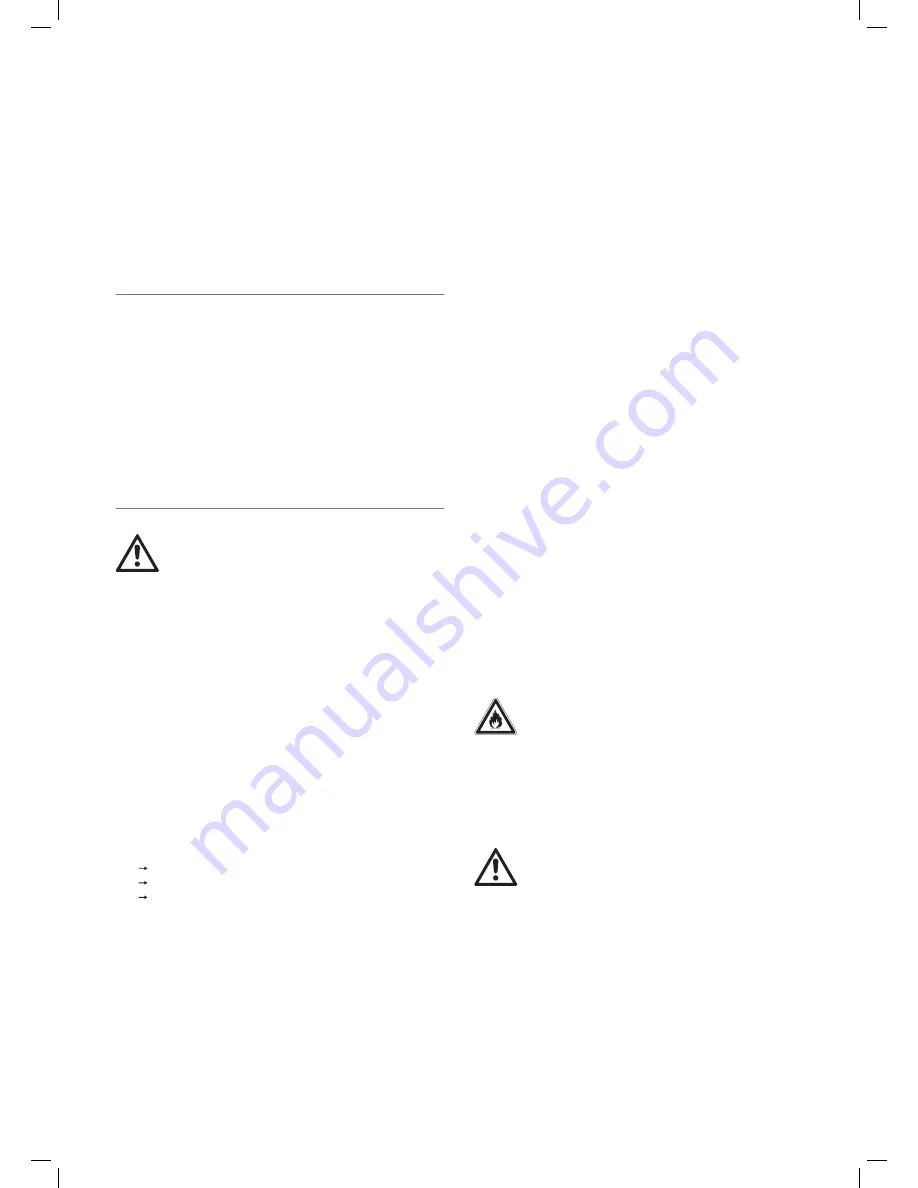
2
TABLE OF CONTENTS
1. Introduction
2
2. Safety precaution
2
3. Intended use
3
4. Parts supplied
3
5. Installation
3
6. Operation
5
7. Maintenance
5
8. Troubleshooting
5
9. Technical data
6
10. Environmental protection
6
1. INTRODUCTION
Thank you for choosing this cooker hood.
This installation and user’s manual is designed to provide you
with all required instructions related to the installation, use and
maintenance of the appliance. In order to operate the appliance
correctly and safety, please read this installation and user’s manual
carefully before installation and usage.
Keep this installation and user’s manual for future use. Should this
appliance be passed on to a third party, then this installation and
user’s manual must be included.
No liability will be accepted for damage resulting from improper
use or non-compliance with these instructions.
2. SAFETY PRECAUTION
Important!
Always switch off the electricity supply at
the mains during installation and maintenance such as
for light bulb replacement.
General
•
The cooker hood is suitable for domestic use only.
Children
•
Please dispose of the packaging material carefully.
Packaging material can be dangerous to children.
Danger of
suffocation!
•
Children should be supervised to ensure that they do not
play with the appliance.
Installation
•
The cooker hood must be installed in accordance with the
installation instructions and all measurements must be
followed.
•
All installation work must be carried out by a competent
person or qualified electrician.
•
When installing the cooker hood, make sure that the following
recommended distances between the top of cooker and the
lowest part of the cooker hood are observed:
Gas cookers:
70cm
Electric cookers:
66cm
Coal or oil cookers: 80cm
•
Do not install above a cooker with a high level grill.
•
Make sure the ducting has no bends sharper than 90 degrees
as this will reduce the efficiency of the cooker hood.
•
Pay attention to the sharp edges inside the cooker hood
during installation.
Electrical safety
•
Regularly check the power cord for damage. If the supply
cord is damaged, it must be replaced by the manufacturer, its
service agent or similarly qualified persons in order to avoid a
hazard.
•
The appliance must be placed in such a way, that the power
supply is accessible at all times.
•
Before connecting the appliance to the power supply, check
that the power supply voltage and current rating corresponds
with the power supply details shown on the appliance rating
label.
•
Never use a damaged appliance! Disconnect the appliance
from the wall outlet and contact your supplier if it is
damaged.
•
Danger of electric shock!
Do not attempt to repair the
appliance yourself. In case of malfunction, repairs are to be
conducted by qualified personnel only.
•
To avoid damaging the cord, do not squeeze, bend or chafe
it on sharp edges. Keep it away from hot surfaces and open
flames as well.
•
Lay out the cord in such a way that no unintentional pulling
or tripping over it is possible.
•
Do not open the appliance casing under any circumstances.
Do not insert any foreign objects into the inside of the
casing.
•
Never use accessories which are not recommended by the
manufacturer. They could pose a safety risk to the user and
might damage the appliance. Only use original parts and
accessories.
•
Keep the appliance away from any hot surfaces and open
flames. Always operate the appliance on a level, stable, clean
and dry surface. Protect the appliance against heat, dust,
direct sunlight, moisture, dripping and splashing water.
•
Do not place heavy objects on top of the appliance. Do not
place objects with open flames, e.g. candles, on top of or
beside the appliance. Do not place objects filled with water,
e.g. vases on or near the appliance.
•
This appliance is not intended for use by persons (including
children) with reduced physical, sensory, or mental
capabilities, or by those who lack experience and knowledge,
unless they have been given supervision and instruction
concerning the use of the appliance by a person responsible
for their safety.
Gas safety
•
Always put lids on pots and pans when cooking on a gas
cooker.
Operation
Danger of fire!
•
Do not flambé under the cooker hood.
•
Do not leave frying pans unattended during use
because overheated fats or oils might catch fire.
•
Never leave naked flames under the cooker
hood.
•
Only fry underneath the cooker hood when you
are in the kitchen.
•
Do not use the cooker hood without the grease
filters, or if the filters are excessively greasy!
Caution!
Accessible parts may become hot when used
with cooking appliances.
Exhaust operation
Danger!
•
During exhaust operation, the cooker hood removes air from
a room. If other fire sources that require the surrounding air
for combustion are being operated in the same room, (e.g.
gas, oil or coal heaters), the oxygen they require is taken
away. Thus flames could be suffocated and gas could leak out
or the fumes could be drawn back into the room.
•
In order to guarantee a safe operation, there should be non-
closable openings in doors, windows or in an air intake wall
box to ensure a fresh supply of combustion air. This will prevent
the combustion fumes from being drawn back into the room.
RS-600 (CHS60SS)-GB-05.indd 2
6/8/2010 9:31:00 AM























